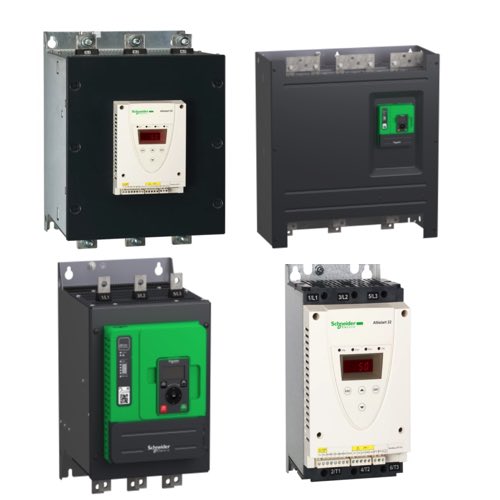Schneider Electric Soft Starters

RSP Supply carries a full line of Schneider Electric soft starters, engineered for smooth motor acceleration, reduced inrush current, and maximum efficiency in industrial applications. These soft starters minimize mechanical stress and extend the lifespan of motors in systems such as pumps, fans, compressors, and conveyors.
Schneider Electric soft starters are designed with reliability and protection in mind. Unlike conventional units that suffer from overheating or bypass relay failures, Schneider’s robust design uses durable electronic components and energy-efficient control outputs to ensure consistent performance and safety. The result is dependable motor operation and reduced maintenance over time. Whether your operation involves simple pump control or complex automation, Schneider’s line of soft starters delivers superior protection, precision, and reliability.
FAQs
Q: Do Schneider Electric soft starters include an integrated bypass?
Yes. Schneider Electric soft starters feature a built-in bypass to reduce heat generation and improve energy efficiency, all in a compact, slim design for easy installation.
Q: What is the main advantage of using a Schneider Electric soft starter?
They provide controlled motor acceleration, reduce inrush current, and prevent mechanical stress, helping to extend motor and equipment life.
Q: What applications are Schneider Electric soft starters best for?
They are ideal for pumps, fans, compressors, conveyors, and HVAC systems, especially where smooth starting and stopping are required.
Q: How does the Altistart 22 soft starter improve torque control?
The Altistart 22 uses space-vector modulation, controlling both voltage and phase for superior torque management during motor startup.
Q: How do Schneider Electric soft starters compare to VFDs?
Soft starters control only the startup and stop phases of a motor, while VFDs allow full speed control throughout operation. Soft starters are more cost-effective when variable speed isn’t needed.
Why Buy Schneider Soft Starters from RSP Supply
At RSP Supply, we combine industry expertise with exceptional customer service to make selecting and integrating Schneider Electric soft starters simple and efficient. Our knowledgeable team can help you find the right model for your application, ensuring optimal performance and protection. With fast shipping, competitive pricing, and dedicated support, RSP Supply is your trusted partner for all Schneider Electric motor control products.

